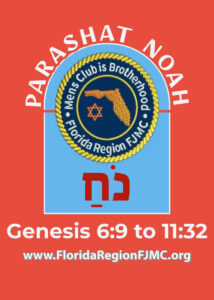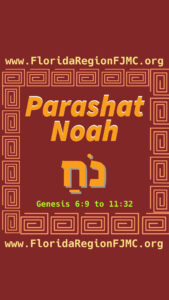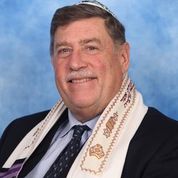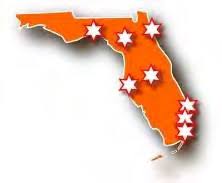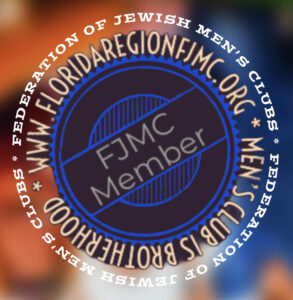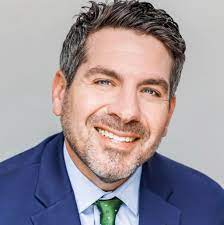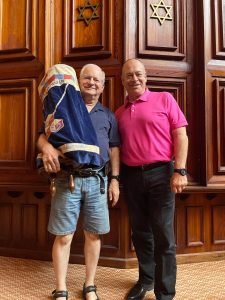
When you Choose Shabbat, you choose to learn that every Shabbat is different and special. This week I learned about Parashat Noah (נֹחַ), the second weekly Torah portion in the annual cycle of Torah readings. I learned that Noah was considered a righteous person “of his generation”. I also learned about the seven Noachide laws; (1) Do not deny G-d, (2) do not blaspheme G-d, (3) do not murder, (4) do not engage in incestuous or adulterous relationships, (5) do not steal, (6) do not eat of a live animal and (7) establish courts and a legal system to ensure law obedience.
According to Wikipedia, Noah, Genesis 6:9 through 11:32, contains 6,907 Hebrew letters, 1,861 words, 153 verses and makes up 230 lines of the Torah scroll, giving Noah the most verses of any weekly Torah portion in the Book of Genesis, but not the most letters or words. Parashat Miketz has the most letters, Parashat Vayeira has the most words, and Parashat Vayishlach has an equal number of verses as Parashat Noach.)
Rabbi Michael D Klein of Temple Torat Emet offers his insights on this week’s Torah reading, Noah, for Shabbat November 2, 2024 aka 1 Cheshvan 5785:
“Everyone is familiar with the story of Noah and the Ark. This narrative is found in various forms in ancient cultures and suggests that, in the distant past, there was a massive flood which caused the extinction of many species. The moral background given to us in the Torah is that G-d was angry with humans because we had degenerated into violence and moral depravity, the exact opposite of what G-d had envisioned when humans were created. This raises several theological questions. If G-d has the power to create humans, why then does G-d not destroy only those who were evil? Further, why is all creation doomed to suffer because of the actions of humans? Apparently, the Torah posits, G-d created humans to become partners with G-d but this partnership never materializes except for Noah and his family who are the embodiment of good and righteous people in their generation.
Why, in the 10 generations from Adam and Eve to the generation of Noah, did mankind degenerate into the embodiment of evil instead of good? Does this suggest that evil is stronger than good? We are given a clear picture of this degeneracy in the previous Sedra in the form of Lemech, the great grandson of Adam and Eve, who boasts about his ability to kill seven times greater than Cain. The ultimate evil is exemplified by the ancient King Nimrod who decides to go to war with G-d by building a tower to heaven and who has little concern that the builders on the top are literally stepping over the dead bodies of those builders who perish in the process of building.
Why, then, does it take 10 more generations, until Avram and Sarai appear, to again bring the world to a new level of kindness and decency and acknowledgement of G-d’s unity and supremacy? There are many perplexing moral and ethical questions posed by the narrative of Noah and the flood and we must find the answers by searching the commentaries of the Sages who also still grapple with the complexity of belief in our own age of moral and ethical decline.”
Questions to consider:
- The Hebrew word for ark is “Tevah”. Where else is this word used and in what context?
- Why are there time discrepancies in the Torah as to the total number of days in the Ark? (See Genesis 7:12, 7:21) ?
- What does the rainbow represent at the conclusion of the flood narrative? How is this different than the original covenant with Adam and Eve?
- How is Noah’s reaction to the news of the great destruction to come morally incomplete?
Rabbi Michael D. Klein attended Yeshiva College of South Florida and served as Torah Reader, Hebrew teacher, Chazzan and spiritual leader of various synagogues throughout South Florida. In January 2015 he became Ritual Director, Bnai/Bnot Mitzvah instructor and 7th grade Hebrew instructor for Temple Torat Emet of Boynton Beach. In October 2019 he was accepted into an accelerated track and received his smicha from Yeshiva Adath Wolkowisk and has been the Rabbinic leadership of Temple Torat Emet since August 2020. In September of 2022 he was appointed Rabbinic and Spiritual Advisor of the Florida Region of FJMC.
Choose Shabbat; choose to celebrate, to light candles, sing songs and learn a little Torah.
This moment of Jewish learning is brought to you by the Florida Region of the Federation of Jewish Men’s Clubs (FJMC). We serve the needs of affiliated Men’s Clubs and Brotherhoods throughout the State of Florida. Learn more about the FJMC Florida Region and our growing network of Jewish Men’s Clubs and Brotherhoods at: www.floridaregionfjmc.org and please visit & LIKE our Facebook Group at: www.facebook.com/FloridaRegionFJMC.
The FJMC is a confederation of over 200 Jewish Men’s Clubs and Brotherhoods representing over 20,000 members across the United States, Canada, Latin America, and beyond. Learn how YOUR Jewish Men’s Club or Brotherhood can affiliate with the FJMC at: https://fjmc.org/for-clubs/affiliating-with-the-fjmc/.
